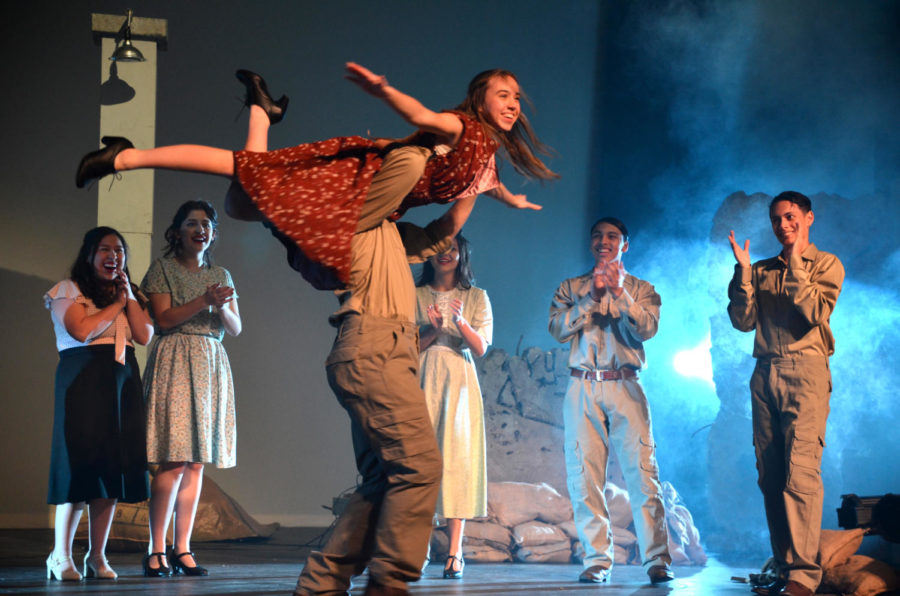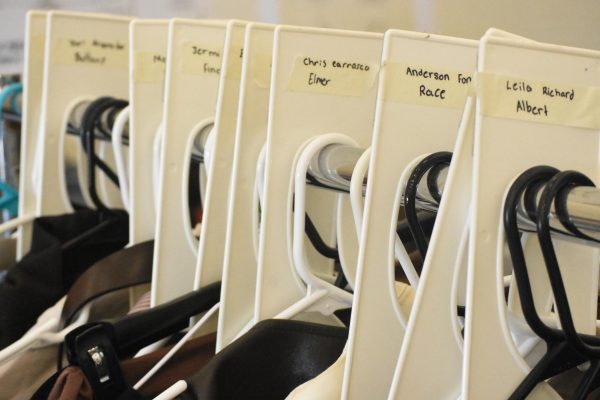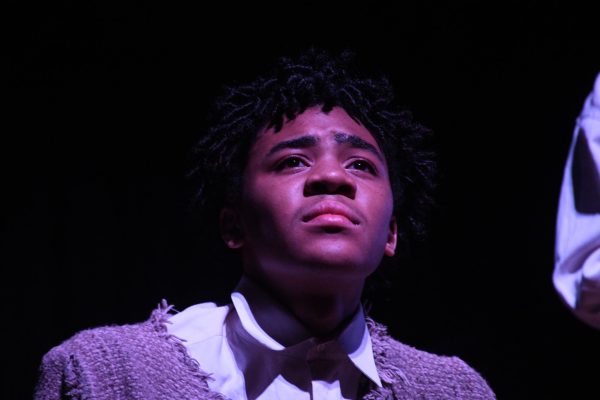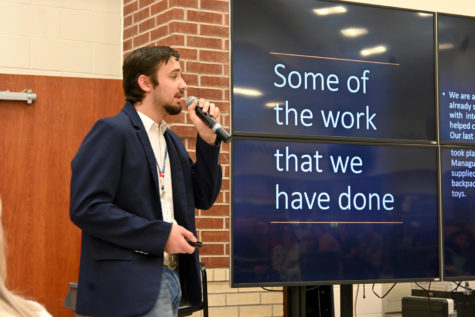Theatre Performs “Front” with Emotion, Showcasing Complexities of Wartime
Junior Reece Cotto, as a young soldier, lifts junior Colleen O’Brien. Colleen played two roles, son Tim and young girl Viv. In this scene, the two dance and later share an intimate moment right before he goes off to war.
The production of “Front” by the AHS Theatre department took the stage this March and April. The UIL One Act Play (OAP), performance followed the lives of soldiers on the front and their families on the English home front as WW II raged on.
In a UIL OAP performance, the director, members of the cast and members of the crew only have a seven minute time period to set the stage and a seven minute time period to strike the stage. The play must begin no more than 60 seconds after the stage is set. This limits the amount of props and scenery that can be used to what can be set up in that time period.
The AHS Theatre did an amazing job of designing a set that worked for all of their needs. Reminiscent to the Black Box productions earlier this year, the set created a space where the confines of the stage did not limit the abilities of the actors and actresses. With destruction from bombs framing the stage, some open areas for interactions between cast members and a dinner table that served as the home of one of the main families in the play, the set was well-designed and aided in the storytelling.
Opening on a bombing, the scene of the play was instantly characterized as dramatic. Senior Zoey Robles (as Sheila) stands on the smoking wreckage and screams, then runs for cover. The chaos and fear is evident in the play’s nature, which contrasts greatly with the prepared intentionality of the seven minute set period.
Every member of the cast performed well under pressure, and there were next to no errors in either of the two performances I attended. The weighty subject matter was handled beautifully, with an appropriate amount of somber moments, but with enough lightness to show that life was still going on, despite the gravity of wartime. The quick change between dancing and death scenes in the middle of the play showcased the acting skills of the cast, who came across just as sincere every moment.
“Front” was not truly a play about war, but a play about how people are changed by wartime. Angie (played by sophomore Andie Cotto) was one of the most dynamic in the play. She is a 16-year-old daughter of a soldier, Frank (played by senior Trent Tisdom), and Judith Gently (played by senior Sarah Squires), and when she goes to dance with soldiers who will go off to war the next day, she gets pregnant. This leads to a moment where she chooses to end her life. Standing with a rope around her neck, she is visited by her father, who convinces her to live, for her son and for the sake of her father, who has died but says he needs his family to go on for him.
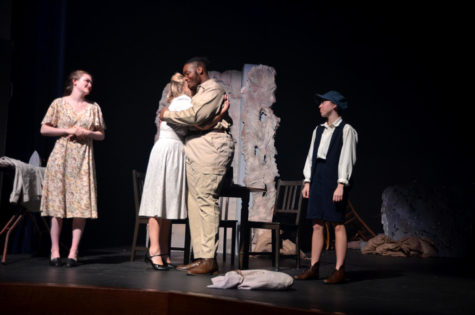
Sarah Squires was again showcased in the role of the mother. With the same raw talent she showed in “Mamma Mia” and “Steel Magnolias,” she ranged all emotions, from anger to sorrow, and showed her love for her country, her family and her values throughout the
play. Frank was also a complex character. Acting as both a father and a husband, Trent was the only actor to sing in this play, as he had a moment where he sang and danced with Sarah Squires. He also had some dramatic moments, such as his death scene and the end scene where he waves a flag and passes it off to another cast member. He did a great job of again acting as a strong father figure (he was one of the lead male roles in “Mamma Mia”). His son, Tom (junior Colleen O’Brien) was well acted and brought a sense of how innocence is affected by war to the play.
Monologues featured different actors and actresses’ talent. Sheila (played by senior Zoey Robles) performed a monologue in the scene about soldiers going off to war seeking intimacy before they ship out, and the conflict her character felt in regards to the soldiers’ touch was evident in her voice, expression and body language.
Brian (junior Bryce Hobbs) also had a moment shared in the spotlight with Angie, and his portrayal of a soldier who loves the control of standing in the middle of the bomb blitzes instead of hiding was terrific, making his character seem simultaneously both foolish and wise.
Joan Justice (played by sophomore Vanessa Solis), a widow and mother of a soldier, has a monologue toward the end of the play in which she shares how her circumstances have led to decisions she has made. The drama of her previous scenes, where she has shown vulnerability and anger, builds up to the final moment, when she has an emotional breakdown and shoots a soldier, and Vanessa delivered the monologue with a perfect balance of emotion and reasoning.
The interaction between the characters is also very well-done, with families and friends relying on each other during the war. The scenes with Mr. and Mrs. Briggs (junior Kendrick Tewasilmal and senior Julia Garza, respectively) and their son Alister (sophomore Aiden Espino) were especially sweet and added a bit of comedy to the somber subject of war.
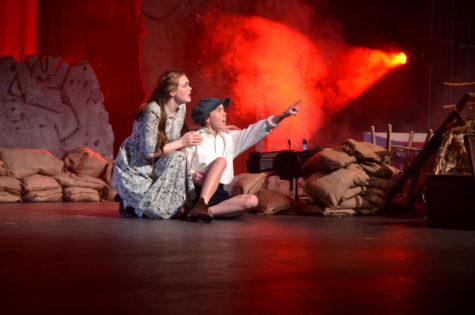
These are just a few of the key moments in the play, but each actor and actress did a spectacular job of becoming the character they were cast as. The raw emotion and talent alike were evident from the audience, and every line was delivered with poise and purposefulness.
The only slipup I noticed was that someone ran into a set piece and it got moved a little in one showing, but the cast continued through the production without allowing that to district them and it wasn’t a big deal. There was also a moment in one of the seven minute set times that had everyone holding their breaths, when the curtain came down on a set piece and those on stage had to figure out what to do. Once they decided to open the curtain back up, the set period went on as planned.
As a member of the band who was in the fine arts hallway after school both times the theatre department’s haze machine set off the fire alarm, I was a bit concerned that this would be an issue during the UIL performance. Luckily, this situation was rectified, and the haze machine added an extra degree of drama to the bomb scenes (as it did previously to our after-school band and orchestra rehearsals).
The theatre has been repeatedly recognized positively for this performance, and rightfully so. They did a terrific job portraying the emotion and complexities of wartime.


